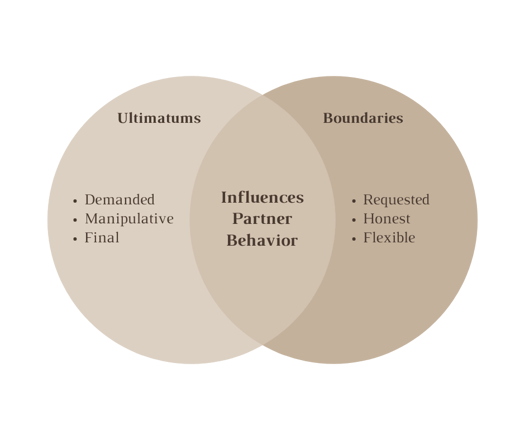How to Express Romantic Love: Effective and Heartfelt Gestures
All the world celebrates romantic love, and people from all walks of life look for ordinary moments and extraordinary ones to express love to their...
4 min read
![]() Williamsburg Therapy Group
:
Jan 20, 2023 5:25:00 PM
Williamsburg Therapy Group
:
Jan 20, 2023 5:25:00 PM

Boundary (noun): A requested limit on behavior, ideally followed in good faith, that serves to establish a healthy neutral zone between you and some of your partner’s behavior.
Ultimatum (noun): A coercive manipulation that utilizes the illusion of choice. In an ultimatum, a person presents one severely unattractive option to the target and uses it to force them into "choosing" a second, only slightly better option.
In this article, we're going to explore the difference between an ultimatum and a boundary, particularly in the context of relationships.
The concepts of boundaries and ultimatums are sometimes confused unintentionally. Other times, a manipulative person might deliberately interchange them in order to paint themselves in a better light.
If you're worried that you or your partner might be using boundaries and ultimatums in an unhealthy way, the first step is to become familiar with each concept. This empowers you to know an unhealthy ultimatum when you see it and resolve it before it hurts you, your partner, or the relationship.
Read more about ultimatums and boundaries on this page:
Ultimatums Focus on Pressure, While Boundaries Invite Opportunity for Growth
How To Set Boundaries in a Relationship: Three Simple Steps
What do I do if my partner gives me an ultimatum?
There are two key differences between an ultimatum and a boundary:
Understanding these differences can help you detect an unhealthy ultimatum early, so you can take steps to protect the relationship.
The intent behind an ultimatum is almost always unhealthy. An ultimatum is extremely final, and in the context of a relationship, it often utilizes threatening to end the relationship as a coercive force.
Compared to potentially losing the relationship, almost anything can be preferable. This is what gives an ultimatum its power. It's a watered-down version of having a sword to your neck: Yes, surrendering is preferable to getting "a little off the top," but ideally, you wouldn't have a sword to your neck in the first place.
Healthy relationships are built on trust. Having trust in your partner means that you understand the importance of their autonomy and free will, while knowing (or hoping) that they will not use that free will to hurt you.
Setting an ultimatum undermines foundational trust because it shows that you don't value your partner's free will. If you trust someone to behave a certain way, you don't need to put a sword to their neck to make it happen.
There are circumstances in which an ultimatum may be necessary for your own mental health and safety—ongoing, repeated offenses of trust-breaking behavior like cheating, for example—but typically, it's better to use boundary communication in order to address any conflict in the relationship.
By contrast to the typical ultimatum, boundaries can be very healthy and can even strengthen a relationship over time.
A boundary uses trust, rather than coercion, to accomplish a goal. A boundary is a request, not a demand.
For example, you might request that your partner not use swear words in front of your children. If the relationship is healthy, you can trust with reasonable certainty that family Monopoly night will go off without a hitch.
Boundaries invite opportunity for growth as well. If your partner communicates a boundary with you, it gives you the opportunity to demonstrate to them, very tangibly, several things:
Even in the healthiest relationships, demonstrating these things never hurts. Using ultimatums typically erodes trust, while boundaries amplify it.

If you want to set boundaries in your relationship, the process is actually very simple. It only requires three steps:
Before talking to your partner about setting boundaries, take some time to reflect on exactly what your personal limits are, why you have them, and how reasonable it is to expect your partner to follow them.
You're about to ask your partner to change something about the way they behave and interact with you, so it's only fair to also consider whether you need to make any changes as well.
Here is a quick list of example boundaries to get your thought process started:
Boundaries and personal limits can be as simple or as complicated as you need them to be. Once you define your boundary and have resolved to make any necessary changes to your own behavior, it's time to communicate the boundary.
The key to setting boundaries effectively is communication. The most common barrier to setting healthy boundaries is defensiveness, so your first step in communicating your own boundaries is to establish a dialogue..
Approach your partner from a place of genuine care and love. It can help to talk mostly about your need to set boundaries rather than the boundary itself.
For example, instead of saying:
"You need to stop going out with your friends without telling me where you are."
Try saying:
"I get nervous when I don't know where you are. While I work on my own issues with that, would you mind just letting me know where you're headed when you go out?"
This reframes the conversation to be less of an attack and more of a conversation. Confronting someone's behavior head-on when setting boundaries gives the impression that you're criticizing them.
Starting with what's going on in your head disarms people and activates their feelings of love and care for you.
Once you set healthy boundaries, you have to make sure they stay intact.
If your partner breaks the boundary, gently correct them. If they continue to do so, be firm.
If you allow a specific boundary to be repeatedly broken, the value of any boundary in the relationship can erode over time.
If your partner is setting unhealthy ultimatums that you feel are manipulative, one of the best things you can do is attend couples therapy.
Often, someone gives an ultimatum out of sheer panic. Maybe they have trust issues, have been hurt in the past, or have suffered some familial trauma that makes them want to resort to an ultimatum.
Couples therapy uses evidence-based techniques to define thoughts and behaviors, analyze how they affect the relationship, and then work to improve communication, respect, and intimacy.
Williamsburg Therapy Group offers couples counseling and therapy in the Austin area. Our expert staff of psychologists is on hand to help you build a healthier, happier relationship.
Schedule an appointment today. Feeling better may be closer than you think.

All the world celebrates romantic love, and people from all walks of life look for ordinary moments and extraordinary ones to express love to their...

What is relationship burnout or relationship fatigue? Many of us have heard of burnout, but we often connect it to professional life and the problems...

In today's digital age, so many of us are locked into our mobile devices each and every day, which can have a negative impact on our mental...